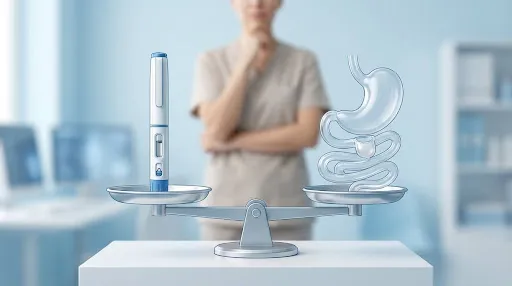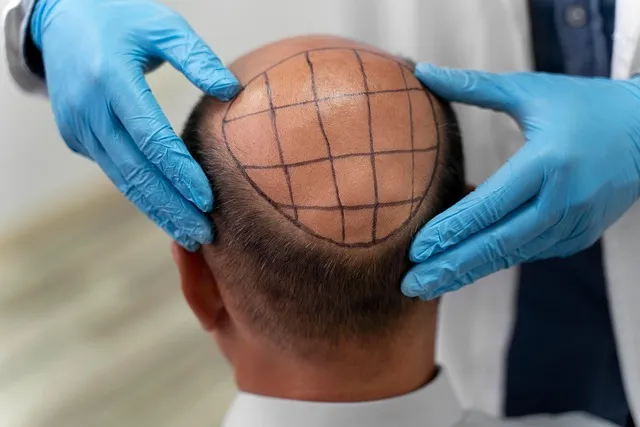If you're using or considering Mounjaro (tirzepatide) for weight loss or type 2 diabetes, you might have heard concerns about hair loss as a side effect. While hair loss is not listed as a known side effect of Mounjaro, some users have reported it during treatment.
So, does Mounjaro cause hair loss really, or is it due to other factors? Let’s learn the truth behind this concern, why it happens, and how you can manage it effectively in this article.
Does Mounjaro Cause Hair Loss? The Truth
No, there is no scientific proof that Mounjaro (tirzepatide) directly causes hair loss (alopecia). The FDA-approved prescribing information for Mounjaro does not list hair loss as a side effect. However,
One clinical review found that hair loss occurs in some individuals who used 5-10 mg of Mounjaro when compared to people who were on a placebo. This suggests that about 10% of users reported hair shedding.
Why Does Hair Loss Happen?
Experts believe the real cause of hair loss while taking Mounjaro is telogen effluvium—a temporary condition triggered by rapid weight loss.
How It Works:
- Normally, 90% of your hair is in a growing phase (anagen), while 10% is in the resting phase (telogen).
- Rapid weight loss acts as a stressor, pushing more hair into the telogen phase early.
- This leads to increased shedding within 2-3 months after starting Mounjaro.
The good news? Hair usually grows back once your weight stabilizes.
When Does Hair Loss Start & How Long Does It Last?
Hair loss with Mounjaro treatment can typically start in around 2-3 months after you begin to experience weight loss and may last for many more months. However, once your weight loss stabilizes and the body adjusts to this medicine, hair loss generally starts to resolve, although the time can vary.
In case you experience persistent hair loss beyond a year, patchy bald spots, or scalp irritation, see a dermatologist for proper evaluation. The doctors can help address the exact cause of hair loss as there can be other factors contributing to hair loss and provide the treatment accordingly.
Other Possible Causes of Hair Loss on Mounjaro
Several factors can contribute to hair loss while on Mounjaro treatment. Those include:
1. Nutritional Deficiencies
Weight loss can lead to a deficiency of key nutrients needed for hair growth, such as:
- Iron – Essential for oxygen delivery to hair follicles.
- Zinc – Supports hair tissue growth and repair.
- Protein – Hair is made of keratin, a protein, and inadequate intake can lead to thinning.
2. Diabetes-related Problems
Uncontrolled blood sugar levels can damage blood vessels, reducing oxygen and nutrient supply to hair follicles.
3. Hormonal Changes
Extreme weight loss can disrupt hormone levels, affecting the hair growth cycle. Imbalances in:
- Thyroid hormones
- Estrogen
- Androgens
… can all contribute to shedding.
4. Stress & Lifestyle Changes:
Significant lifestyle changes, dietary restrictions, or emotional stress from weight loss efforts may also trigger hair shedding.
Other Medications That Can Cause Hair Loss
If you're taking Mounjaro along with other medications, those could also contribute to hair loss:
| Medication Type | Examples |
|---|---|
| Weight loss drugs | Wegovy, Ozempic |
| Oral contraceptives | Birth control pills |
| Heart medications | Beta-blockers, statins |
| Antibiotics & antifungals | Fluconazole, erythromycin |
| Antidepressants | SSRIs, lithium |
| NSAIDs | Aspirin, ibuprofen |
| Excess Vitamin A | Retinoids, Accutane |
Tips To Prevent Hair Loss During Mounjaro Treatment
Consider these tips to prevent hair loss while on Mounjaro and support hair health:
1. Consume a Nutrient-Rich Diet
Support hair health with foods high in:
- Protein – Eggs, lean meats, beans
- Iron & Zinc – Spinach, nuts, shellfish
- Biotin & Vitamin D – Avocados, fatty fish
2. Use Hair-friendly Supplements
If you struggle with nutrient intake, consider supplements like collagen, vitamin D, iron, and biotin. They can help strengthen hair follicles. Collagen promotes hair elasticity and structure while biotin aids in boosting keratin production. But, before consuming any supplement, consult with a doctor.
3. Stay Hydrated
Hydration keeps the hair follicles strong and the scalp healthy. So, drink a lot of water at least 8 glasses per day. This will help with improved circulation which will increase the supply of nutrients to hair follicles and promote regrowth.
4. Manage Stress
Stress plays a huge role in hair loss, so engage in stress-reducing activities such as yoga, meditation, or deep breathing techniques. These activities will promote the hair growth cycle and minimize hair shedding.
5. Avoid Smoking
According to research, smoking can contribute to hair loss by damaging hair follicles. It constricts or compresses blood vessels and prevents the blood flow towards hair follicles, thus, causing hair damage. So, avoid smoking if you notice hair loss when using Mounjaro.
6. Be Gentle with Hair Care
Frequent excessive heat styling (blow dryers, curling irons) can make the hair dry and brittle which can lead to easy breakage of hair follicles. So, the best idea is to naturally let your hair dry and use cooler settings when using hair styling tools.
Do not dye or bleach your hair excessively as it can damage hair follicles and shaft, causing hair loss. In addition, avoid harsh shampoos as they remove natural oil from the hairs and scalp, making them weak and dry. Use gentle shampoos.
When To See a Doctor?
Hair shedding to some degree can be normal, but excessive and continuous hair fall needs professional attention. So, see a doctor if your hair loss is:
-
sudden, severe, and come along with scalp irritation
-
is patchy type or circular bald spots
-
continue for more than 6 to 12 months
-
impacting your emotional health
A dermatologist can perform a comprehensive evaluation through scalp biopsies or blood tests to detect the exact cause of hair loss and provide effective treatment.
Hair Loss Treatments
If hair loss persists, doctors may recommend:
1. Medications
-
Minoxidil: It is approved by the U.S. Food and Drug Administration (FDA) to treat androgenic alopecia (pattern baldness) in men and women. It is an over-the-counter topical medicine rubbed directly on the scalp.
-
Finasteride: This FDA-approved medicine to manage pattern baldness in men only. It is available only as prescription medicine. It's a tablet to take orally with water.
-
Corticosteroids: This is also a prescription medication to treat sudden and severe hair loss. It can slow down the hair loss speed and aid in hair regrowth. They are applied topically, taken orally, or injected into the skin.
2. Platelet-rich Plasma (PRP) Therapy
In case of visible hair thinning or balding, doctors recommend platelet-rich plasma. The providers draw out blood and then separate plasma out of it. They inject the plasma into the scalp that helps slow down hair loss and promote hair growth.
3. Light Therapy
This therapy makes use of medical-grade lights which are directed in the scalp for a short time to regrow the hairs. Light can stimulate the hair follicles which can let the hair grow. Multiple sessions are required for the best results.
4. Hair Transplant Surgery
In case of severe pattern baldness, a hair transplant is recommended. During the hair transplant procedure, the doctors remove hair strands from the scalp area with the thickest hair. They then transplant those hair strands into the areas where the hairs are thinnest.
Final Thoughts
So, does Mounjaro cause hair loss? Well, Mounjaro itself does not directly cause hair loss, but rapid weight loss associated with it may trigger temporary shedding (telogen effluvium). Other factors like nutritional deficiency, stress, hormonal changes, and fluctuation in blood sugar levels while on Mounjaro can also contribute to hair loss.
The good news is hair typically regrows once your weight stabilizes. Support your hair health by eating a balanced diet, and supplements, and engaging in stress management. Be patient – regrowth of hair usually occurs within 6-12 months.
However, If hair loss is excessive or prolonged, consult a dermatologist to rule out any underlying causes.
Concerned about hair loss? Speak to your doctor to find the best approach for maintaining healthy hair while on Mounjaro.
Read Also: Mounjaro Side Effects: A Comprehensive Guide for Patients
Frequently Asked Questions
Can hair loss on Mounjaro be reversed?
Yes, it can be reversed. Hair may regrow in some months once the weight stabilizes and the body adjusts to the Mounjaro.
Should you stop taking Mounjaro if you experience hair loss?
No, always consult the doctor before stopping the use of Mounjaro as hair loss due to its use is temporary. Doctors may help detect the exact cause.
Can you take biotin with Mounjaro?
No vitamin interaction with Mounjaro is reported. However, certain vitamins could potentially raise the risk of low blood sugar levels when taken with Mounjaro. So, always consult a doctor.
What are the complications of hair loss?
Hair loss can lead to physical complications such as scarring, infection, patchy hair growth, and psychological complications like low self-esteem, depression, and anxiety issues.
Which vitamins are good for hair growth?
Vitamin A, D, and C, and biotin are incredible vitamins as they help stimulate hair follicles and support scalp health
Reviewed by







